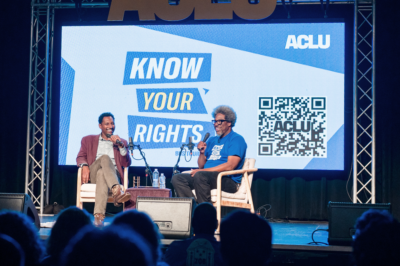New Law Puts Washington at Forefront in Protecting Youth RightsÔÇ»
Police officers must connect youth who are taken into custody with an attorney before conducting an interrogation or asking them to consent to a search, thanks to a new law that puts Washington at the forefront of a national movement to protect the rights of youth.ÔÇ»
The new law requires law enforcement to connect a youth (under 18) with a lawyerÔÇ»beforeÔÇ»they conduct a custodial interrogation,ÔÇ»when theyÔÇ»detain a youth based on probable cause of criminal activity orÔÇ»when theyÔÇ»request that the youth consent to a search of their person, property or vehicle. Consultation with a lawyer can be by phone or in person.ÔÇ»
TheÔÇ»law is informed by research that shows youth donÔÇÖt fully comprehend their rights or understand the consequences of waiving them, making them particularly vulnerable to coercive police tactics. Some studies show that youth waive their Miranda rights at rates as high as 90 percent.ÔÇ»
The law will also help to address the profound racial disproportionalitiesÔÇ»in our criminal legal system. Black youth, Indigenous youth, and youth of colorÔÇ»areÔÇ»arrested, prosecuted and incarceratedÔÇ»at much higher rates than white youthÔÇ»in Washington state. Black youth are almost four times more likely to be adjudicated than would be expected based on the youth population of Washington.ÔÇ»
ÔÇ£This legislation means youth who are scared, confused and vulnerable when stopped by police will receive critical legal advice,ÔÇØ said Anita Khandelwal, director of the King County Department of Public Defense. ÔÇ£Studies show that youth donÔÇÖt fully understand the consequences of waiving their rights. The protections this bill puts in place are essential in ensuring our youth are treated fairly.ÔÇØÔÇ»
ÔÇ£This law improves racial equity and public safety. Black youth, in particular, are historically over-policed and fear and distrust law enforcement as a result of their experiences and those of their friends, family and community members,ÔÇØ said Kendrick Washington II, youth policy counsel for the └¤░─├┼┐¬¢▒¢ß╣¹ of Washington. ÔÇ£Providing legal guidance to youth supports better outcomes for them and for public safety, because youth who feel they are being treated fairly by people in the criminal legal system are more likely to comply with that system.ÔÇØÔÇ»
The bill, ESHB 1140,ÔÇ»was approved by theÔÇ»legislature on April 15. It is now headed to the governorÔÇÖs desk for his signature.
Several lawmakers played a role in ensuring the billÔÇÖs passage, including Rep. Jesse Johnson, the lead sponsor in the House,ÔÇ»and Sens. JeannieÔÇ»DarneilleÔÇ»andÔÇ»MankaÔÇ»Dhingra, who championed the legislation in the Senate.ÔÇ»
ÔÇ£This legislationÔÇ»marksÔÇ»a milestone for our state,ÔÇØ Johnson said. ÔÇ£We are finally addressing a major procedural justice issue for our young people whenÔÇ»theyÔÇÖreÔÇ»being questioned by law enforcement.ÔÇØÔÇ»
The legislation builds on efforts elsewhere, including California, which recently passed a law that requiresÔÇ»law enforcementÔÇ»toÔÇ»connect a youth withÔÇ»a lawyer beforeÔÇ»conductingÔÇ»a custodial interrogation.ÔÇ»
It is also modeled after theÔÇ»MiChanceÔÇ»Dunlap-Gittens Youth Rights Ordinances, which passed in Seattle and King County last summer after a broad coalition of community members ÔÇô including pediatricians, parents, teachers and community advocates ÔÇô testified before the Seattle City Council and the King County Council in support of the new laws.ÔÇ»MiChanceÔÇ»Dunlap-Gittens was a 17-year-old who dreamed of going to law school before he was shot and killed by police in a botched sting operation in 2017.ÔÇ»
Since passage of the Seattle and King CountyÔÇ»ordinances, Khandelwal said lawyers from DPD have helped several youth gain much greater clarity about their rights. There has been no increase in the number of youth arrested or booked due to the ordinances, she said.ÔÇ»ÔÇ»
The state legislation wasÔÇ»alsoÔÇ»supported byÔÇ»numerous community groups, including Washington Black Lives Matter Alliance, Mockingbird Society, Community Passageways,ÔÇ»Collective Justice,ÔÇ»CHOOSE 180, Disability Rights Washington and Creative Justice. All told, 37 statewide organizations and advocates signed a letter in support of the bill.
ÔÇ£Guaranteeing access to a public defender who is vested in the best interest of our young people before they give up their rights is a big step in the right direction on our journey towards justice,ÔÇØ said Sean Goode, executive director of CHOOSE 180, an organization that works to keep youth out of the criminal legal system.
Stay Informed
Sign up to be the first to hear about how to take action.



